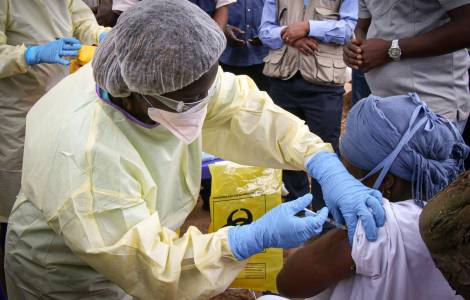
World Health Organization (WHO)
by Cosimo Graziani
Abuja (Agenzia Fides) - In recent weeks, a Lassa fever vaccine developed by local researchers in Nigeria has shown initial signs of effectiveness in combating the disease, which recorded 747 new cases and 142 deaths in the African country in the first half of 2025. This was announced by Simeon Agwale, CEO of the Nigerian pharmaceutical company Innovative Biotech. The vaccine was developed under license from the University of Melbourne, and test doses were produced in the United States until the necessary infrastructure is established in Nigeria.
For the African giant, the possibility of developing and producing this vaccine locally represents a significant achievement for the country, especially considering that the mortality rate has increased compared to 2024. This progress reflects a positive trend regarding the development of vaccines across the continent.
Several African countries are striving to increase domestic vaccine production, a priority that has gained importance since the COVID-19 pandemic. In 2022, the Partnerships for African Vaccine Manufacturing (PAVM) initiative was launched, aiming to produce 60 percent of Africa's vaccine needs by 2040 (currently just 1 percent).
The challenge of vaccine manufacturing is also related to the planning and development phase.
According to the Africa Centre for Disease Control and Prevention (CDC), the African Union department that deals with disease prevention and control, in 2024 there were 25 vaccine projects across the continent: 15 in early stages of development, five with production capacity but no transfer capacity, and five with both production and transfer capacity. These figures are positive and are underpinned by the fact that there are at least a dozen active pharmaceutical companies across the continent in countries such as Nigeria, Morocco, Egypt, South Africa, and Algeria. All of these aspects contribute to strengthening the vaccine ecosystem, which has already borne fruit in the past, such as the Ebola vaccine developed after the 2013 outbreak in West Africa.
Three major agreements to strengthen vaccine production capacity in Africa were recently announced, one signed in December 2024 and two in February of this year. The first involved the U.S. International Development Finance Corporation, the African Development Bank, and the International Finance Corporation (IFC). It provided $45 million to VaxSen, a subsidiary of the Dakar-based Pasteur Institute in Senegal, a country also very active in vaccine research. The agreement was intended to strengthen production capacity, support the local supply chain, and create a strong vaccine distribution network, as envisioned in the African Union's 2040 Strategy, of which PAVM is a part. In addition to its impact on healthcare, the agreement should also have an impact on the creation of skilled jobs, as the Pasteur Institute's facilities are being expanded. The question arises whether this project will also be scaled back or even canceled following the Trump administration's cuts in international cooperation in recent months.
The first of the agreements signed in February concerns a $1.2 billion investment by Gavi-the Vaccine Alliance, a public-private partnership that supports vaccination projects worldwide, particularly for children. According to this agreement, the funds will be used to establish an RNA vaccine production platform in Africa, involving both private African companies such as the Egyptian company EVA Pharma and foreign companies such as the French company DNA Script and the Belgian companies Unizima and Quantoom Biosciences. A second agreement signed in February, however, is a purely African collaboration: Egyptian Biogeneric Pharma and South African Afrigen will expand the development of RNA vaccines to also strengthen continental expertise in manufacturing and application to combat diseases plaguing the continent.
These initiatives were listed in the report published by the Coalition for Epidemic Preparedness Innovations (CEPI) in February this year. The Oslo-based foundation pointed out that among the issues that need to be resolved to develop a self-sufficient vaccine industry in Africa are problems with access to finance, production restrictions, tariffs, and customs duties and uncertain demand. The problem of the vaccine market in Africa has a major impact on the decisions of various vaccine companies around the world, also taking into account the fact that Africa's population, especially its young population, will continue to grow strongly in the coming years. (Agenzia Fides, 19/6/2025)